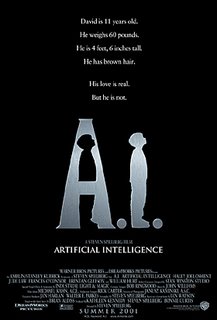A.I., Data, and the Soul

We define the soul as born from the breath of God, immortal, corporeal, having shape, simple in substance, intelligent in itself, working in various ways, having free will, subject to contingent circumstances, in its moods changeable, rational, exercising control, possessing intuition, overflowing out of one source.
Tertullian (155–230)
I recently watched the movie A.I. Not a bad flick, but it won’t be replacing The Big Sleep as my favorite movie. The movie did, however, leave me thinking about artificial intelligence and the nature of the soul.
Desire and the Will
In the movie, David, the little machine boy, has the Pinocchian desire of becoming a real boy. This desire sets David on a trek to find the Blue Ferry, who supposedly can bring his desire to realization. Cute story.
Here’s the problem: desires are not physical and thus not produced by matter. They are products of the will. Therefore, a purely physical object like David cannot engage in such soulish activities as desiring (neither could we, by the way, if the materialists are right). So the pain the audience feels because of David’s unfulfilled desire is completely misplaced—David cannot desire, so it cannot experience the emotional pain of unfulfilled desires (another activity of the soul).
Being
My dear-old grand pappy always told me to “never switch androids in midstream,” but I’m going to anyways (I’m a rebel). Star Trek: Next Generation’s Commander Data had a pet cat named Spot. Data could tell you everything about that cat—from its molecular structure on up. But Data could never tell you what it’s like to BE a cat. That’s beyond a machine’s capability, and couldn’t be otherwise.
Even with Data's emotions chip, all it could do is mimic humanity. Unlike Data, I’m a human being (despite what my wife says); that’s concrete (physical). My “being” a human being entails my “humanity” which is abstract (not physical).
With a machine, what you see is what you get. But like the “redness” (abstract) of Rudolf’s red nose (concrete), human beings are more than the sum of their parts. We are “beings”; machines aren’t. Sorry, Data.
Memories
Back to A.I. Warning: If you haven’t seen the movie, what follows is a “spoiler.”
The aliens that find David are able to grant the wish—sort of. Although they cannot make it a real boy, they can bring back its human “mother” for one day. All they need is a strand of her DNA. Thankfully, the forward-thinking Teddy Bear has a strand of her hair.
In a nutshell, the aliens bring her back with most of her memories in place (odd though; she remembers the robot boy but seems to have forgotten her real family); they have a fun day together (another activity of the soul); then she goes bye-bye, and we all feel sad.
Once again, here’s the problem: Memories are not physical (not extended into space). Therefore, even if the aliens can produce her body from the DNA, they could not produce “her.” Her “identity,” which would include her memories, would not be present, for they are a product of the mind. More realistically, it would be like she had just died—you would have a body, but nobody would be home.
Conclusion
Despite the imaginations of TV and movie writers, even the most sophisticated machine will never be able to engage in actual soulish activities. These activities, being non-physical, will always be out of reach for even the most sophisticated thingamabob—but it does make for good fiction.
--The Catechizer
Labels: Philosophy




0 Comments:
Post a Comment
<< Home